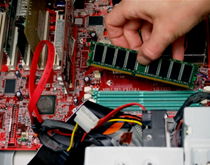Hey, everyone, Josh from Computer Fitness back with another award-winning article to help you with your computer conundrums.
So you need a new computer? Well, it happens to all of us. Eventually our machines, even though they were once powerhouses, need to be replaced. Now, if you’ve been out of the game for a while, you might not know about everything you need to for today’s applications. Well, here are some things to look for when picking up or building a new computer.
Processor (CPU)
The CPU, or Processor, in a computer is what helps it perform most of its duties. The CPU allows the computer to solve equations, execute tasks, etc. The faster this is, the quicker programs will run. Now, for today’s applications, you want something in the Dual Core line with at least 2.5 GHz for each core. If you really want a screaming fast machine, go with a Quad Core at 3.0 GHz or more. The latter is good for gaming or advanced graphical work, while the former will be good for day to day processing without the need for upgrades in the near future.
Memory (RAM)
While the CPU helps to run programs, the RAM assists. RAM is temporary memory used to store the data needed to run programs. RAM holds the data and the CPU processes it. Now, you want at least 2GB of DRR2 RAM these days, though 4GB of DDR3 RAM would be better. Most operating systems will use up 1GB to start, so you’d already be 50% down with 2GB. Better to go with the 4GB, in my opinion.
Storage Space (Hard Drive)
Think of this like your brain’s long-term memory. You use the Hard Drive (HDD) to store data permanently. This is used to hold your operating system, photos, documents, etc. Bigger is better here, so go with at least 400 GB. Now, if you’ve embraced the digital age and frequently purchase games, movies, and music online, I’d recommend going with 1 TB for your HDD. You’ll avoid needing a backup soon, besides using multiple drives can get complex.
-Josh







 Hello and welcome to
Hello and welcome to 

